Given the events in Japan and the ongoing concerns about the damaged Fukushima Daiichi nuclear reactors, I just wanted to point out that the New York Times has several very helpful images that explain the design of that type of nuclear reactor and what has happened over the last several days. The Union of Concerned Scientists has also posted several updates on their All Things Nuclear page.
The last decade or so had shown gradually increasing public support for nuclear energy. Just a year ago a Gallup poll of 1,014 U.S. adults showed the highest level of support since they first asked about nuclear power in 1994, with 28% saying they “strongly” and 34% saying they “somewhat” favor nuclear energy:
In November 2009, Ipsos MORI, a market research firm in the U.K., interviewed a representative sample of 2,050 people in Great Britain about their perceptions of the nuclear energy industry (at the request of the Nuclear Industry Association). Results of the question “How favorable or unfavorable is your opinion or impression of the nuclear energy industry?”:
Men viewed the nuclear industry more positively than women did:
Not surprisingly, the crisis in Japan has led to concerns about nuclear power in other countries; Germany, for instance, is at least temporarily shutting down all facilities built before 1980. There is likely to be increased scrutiny of older nuclear power facilities, in particular.
Sangyoub Park, an Assistant Professor of Sociology at Washburn University, sent in this map showing the location and age of reactors in the U.S. (via the U.S. Nuclear Regulatory Commission):
Though the current events in Japan would seem likely to decrease public support for nuclear energy, if the crisis at the Japanese nuclear facilities are contained with relatively little perceived harm, it’s possible we could see little long-term impact on public opinion. People might think that if a nuclear plant can be hit by an earthquake and a tsunami, suffer multiple explosions and fires, and not have a core meltdown, then they must be pretty safe. I’ll keep my eye out for polls on the subject over the next few weeks/months.
UPDATE: Sangyoub found a Gallup poll released this afternoon showing that the ongoing problems controlling the damage to nuclear reactors in Japan have increased public concerns about the possibility of a nuclear disaster in the U.S.:
This led to a dip in support for nuclear energy; the percent “somewhat” or “strongly” opposing nuclear power rose from 33% in 2010 to 38% now:
Related posts: the power of images in the environmental movement and Chernobyl, then and now.

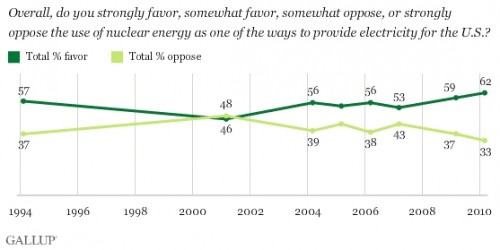
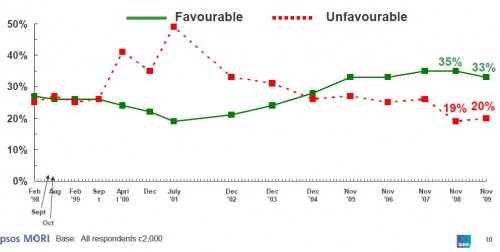
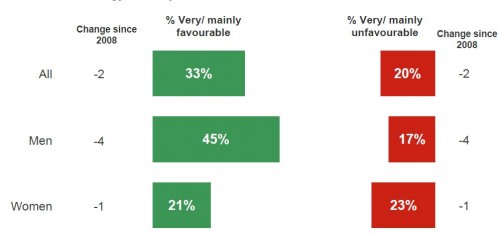
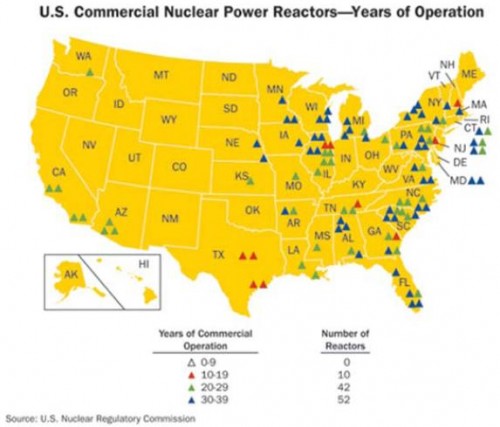

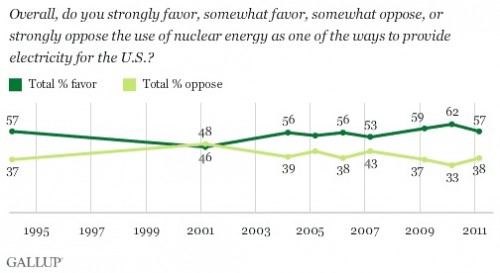
Comments 37
A — March 16, 2011
I'm actually a bit surprised by the backlash against nuclear power... A record-breaking earthquake followed by a tsunami are pretty unusual and incredible circumstances, and the fact that the old plant has even held up as well as it has so far speaks well for nuclear power.
But more importantly, why is there usually such an intense reaction to nuclear power over other forms of power? Coal mining is VERY dangerous, between accidents and the health effects on miners, and ditto drilling for oil. Yet every time there is a mining accident, governments don't suspend coal usage, and though there is generally a vague "We should be switching to another energy source from coal" it has never been a change of public opinion like this has the potential to be. After the BP incident, people iterated the idea that we should be switching to cleaner forms of energy, but there was not really a MOVEMENT about it.
Part of it, I understand, is the potential enormity of a nuclear disaster. But how often do reasonably well-maintained nuclear power plants cause nuclear disasters? So far, never.
The other reason, I think, has to do with the way the media covers nuclear power. CNN already got some flak for reporting a "nuclear blast" a few days ago that was actually "a non-nuclear explosion at a nuclear plant," but generally the way the news describes nuclear power is pretty sensationalist.
Anyway, personally I never understand the knee-jerk reactions against nuclear power as opposed to other forms of power, so does anyone want to try to explain?
Arney Molstar — March 16, 2011
http://www.nytimes.com/interactive/2011/03/13/world/asia/satellite-photos-japan-before-and-after-tsunami.html?ref=asia
Sensationalism at its finest. Every single picture was either doctored to induce fear and terror, or left without the proper treatment to make them look like they came from the same satellites.
Hey, they built a nuclear reactor in one of the most geologically hostile locations on earth, thats a feat by its self. However, they really should have earthquake proofed the facility more. At this point, it doesn't look like that plant is ever coming back online.
Jeffrey C. Goldfarb — March 16, 2011
The public perception of nuclear energy as revealed in response to the news from Japan involves the universal between theme of man versus nature. Man defeats nature, tamed earthquake, nature defeats man, overwhelming tsunami as natural force, man defeats man? destructive nuclear technology. See http://www.deliberatelyconsidered.com/2011/03/man-versus-nature/
Jared — March 16, 2011
The problem is that literally no one in the general public has any sort of idea about nuclear power that is even close to well informed, as evidenced by the general "uproar" about the Japanese situation and this very comment thread. A lot of words with no real meaning get thrown around because people have no idea what the actual discussion should be about- and that's the problem.
Arney Molstar — March 17, 2011
Public opinion matters, but it is not the ultimate decision maker. American politicians know that the people are not in tune with politics or the real engineering issues behind the reactors, so they don't follow opinion as much as they would with other matters.
But of course, we are also faced with the problem that politicians themselves often don't know the science behind the reactors. This is less of a problem when they consult experts. But as the Islamic witch trial show, that isn't always the case.
JJ — March 17, 2011
Intersesting. The math done up there in the comment thread only mentioned disasters. As in: a once in a lifetime failure of the system.
No one here mentioned yet anything about the polution going on ALWAYS when using nuclear power plants. You know, the nuclear waste. Anyone thinking about it? Anyone here thinking about how that stuff is still, you know, **radiactive**? The stuff that needs to be put in a deep geological repository for **thousand** of years?
But ah, I forgot: That only happens in my dreams since many countries dispose of their nuclear waste in open space/near cities somewhere in Russia, oceans, rivers and so on...
naath — March 17, 2011
http://www-958.ibm.com/software/data/cognos/manyeyes/visualizations/2e5d4dcc4fb511e0ae0c000255111976/comments/2e70ae944fb511e0ae0c000255111976 is an interesting graphic of deaths per TWh of electricity.
Whilst people often fear nuclear power, in actuality coal fired power stations cause a great many more deaths than nuclear ones.
How We See Nuclear Power Plant Safety « Science Is Everyone's Story — March 17, 2011
[...] risks of nuclear power are almost unique in their capacity to [instill] public concern.” The Sociological Images blog shows public support for nuclear power in the United States has dropped since the earthquake and [...]
The Atomic Age » “PUBLIC PERCEPTIONS OF NUCLEAR ENERGY UPDATE!” via Sociological Images — March 17, 2011
[...] For charts and details, continue reading at “PUBLIC PERCEPTIONS OF NUCLEAR ENERGY UPDATE!” [...]
Educación nuclear | Mutaciones — March 26, 2011
[...] El blog Sociological Images tiene más información sobre la percepción pública sobre el uso de la energía nuclear en EEUU, y cómo se ha visto afectada por los eventos en Fukushima. This entry was posted in Enlaces, [...]
How We See Nuclear Power Plant Safety - Kat Friedrich — September 27, 2015
[…] risks of nuclear power are almost unique in their capacity to [instill] public concern.” The Sociological Images blog shows public support for nuclear power in the United States has dropped since an earthquake and […]